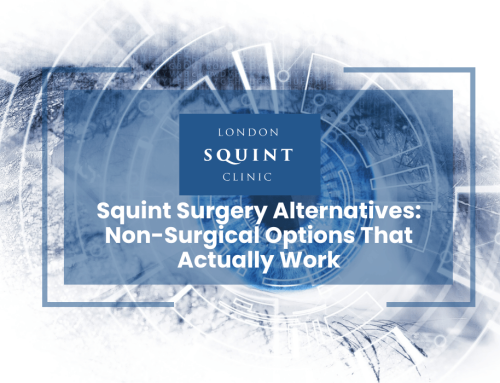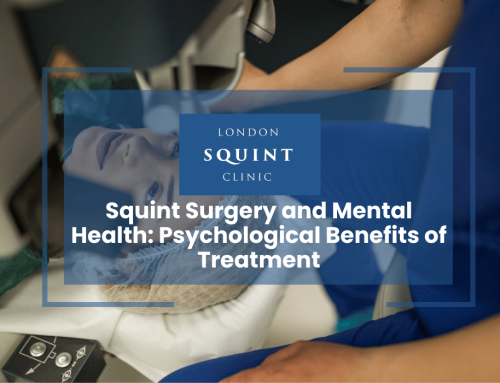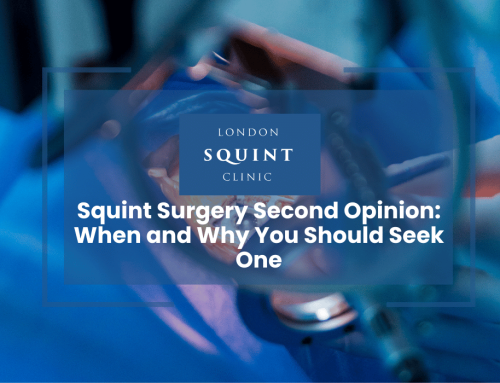Squint Surgery Waiting Lists: How to Get Fast-Track Treatment in London
Essential Insights for Squint Surgery Patients
- NHS waiting times for squint surgery typically range from 18-24 months, with adult non-urgent cases often facing the longest delays.
- Private treatment in London offers consultations within days and surgery within 2-4 weeks of initial contact, providing a significantly faster alternative.
- Self-referral to private specialists is the most direct route to expedited treatment, bypassing the multi-step NHS referral process.
- Urgent cases include acute-onset double vision, childhood squints with amblyopia risk, and post-traumatic strabismus, though even these face delays in the NHS system.
- Private squint surgery in London typically costs between £3,000-£11,000, with the investment offsetting potentially years of waiting and associated quality-of-life impacts.
- Specialist strabismus surgeons offer the best outcomes; look for subspecialty focus, fellowship training, and high surgical volumes when choosing a provider.
- Being flexible with appointment times, surgeon selection, and facility location can significantly reduce waiting times in both NHS and private pathways.
Table of Contents
- Understanding NHS Waiting Times for Squint Surgery
- Private Squint Surgery: A Faster Alternative in London
- How to Access Fast-Track Squint Treatment Options
- What Qualifies as Urgent Squint Surgery Cases?
- Comparing NHS vs Private Squint Surgery Pathways
- Finding Specialist London Eye Surgeons for Quick Appointments
- Steps to Expedite Your Squint Surgery Journey
Understanding NHS Waiting Times for Squint Surgery
NHS waiting times for squint surgery have seen significant increases in recent years, with many patients experiencing delays of 18-24 months before receiving treatment. These extended waiting periods can be particularly challenging for those suffering from strabismus (squint), as the condition can cause both functional vision problems and psychological distress due to cosmetic concerns.
Several factors contribute to these lengthy waiting lists:
- Limited NHS resources and theatre capacity dedicated to ophthalmological procedures
- Prioritisation of cases based on clinical urgency rather than patient preference
- The complex referral pathway requiring GP appointments, ophthalmology referrals, and orthoptic assessments
- Post-pandemic backlogs that continue to affect elective surgeries
For adults with long-standing squints, the NHS may classify their condition as “non-urgent,” further extending waiting times. Children’s cases are typically prioritised due to the risk of developing amblyopia (lazy eye), but even paediatric cases can face significant delays depending on local NHS trust resources.
These extended waiting periods can have real consequences for patients, including prolonged double vision, headaches, eye strain, and the ongoing psychological impact of visible eye misalignment. For many, the question becomes not whether they need treatment, but how quickly they can access it.
Private Squint Surgery: A Faster Alternative in London
Private squint surgery offers a significantly expedited pathway to treatment for patients unwilling or unable to endure lengthy NHS waiting lists. In London, specialist clinics like the London Squint Clinic can provide consultations within days and surgery within weeks of initial contact—a stark contrast to the NHS timeline.
The advantages of choosing private squint surgery in London extend beyond speed:
- Initial consultation typically available within 1-2 weeks (often within days)
- Surgery scheduling possible within 2-4 weeks of consultation
- Direct access to consultant ophthalmologists specialising in strabismus
- Continuity of care with the same surgeon throughout your treatment journey
- Flexible appointment times to accommodate work and personal commitments
- Comprehensive pre and post-operative care packages
London offers particular advantages for private eye surgery, hosting world-leading specialists in strabismus treatment who have extensive experience in complex cases. Many of these surgeons also work within the NHS but can dedicate more time to individual patients in their private practice.
While cost is naturally a consideration, many patients find the investment worthwhile when weighing it against the quality-of-life improvements and the opportunity cost of waiting years for NHS treatment. Private squint surgery in London typically ranges from £3,000-£11,000 depending on complexity, surgeon expertise, and facility choice.
How to Access Fast-Track Squint Treatment Options
Accessing fast-track squint treatment requires understanding the available pathways and taking proactive steps. For those seeking expedited care, several options exist beyond the standard NHS referral process.
The most direct route to fast-track treatment is self-referral to a private squint specialist. Unlike the NHS pathway, private care allows patients to bypass the multi-step referral process and contact specialist surgeons directly. This approach can save months of waiting time and multiple appointments.
Steps to access fast-track squint treatment:
- Research specialist strabismus surgeons in London who offer private consultations
- Contact private eye clinics directly to enquire about appointment availability
- Prepare your medical history and any previous treatment information
- Ask about fast-track or expedited surgery options during your consultation
- Discuss financing options if cost is a concern (many clinics offer payment plans)
Some patients may also explore health insurance coverage, though it’s important to check policy details as elective squint surgery may have specific requirements or limitations. Fast-track private treatment options can be particularly valuable for those experiencing significant functional impairment or psychological distress from their condition.
For those unable to pursue private treatment, discussing the impact of your squint on daily functioning with your NHS doctor may help prioritise your case, though this rarely matches the speed of private pathways.
What Qualifies as Urgent Squint Surgery Cases?
Certain squint conditions warrant urgent surgical intervention due to their potential for causing permanent vision damage or significant functional impairment. Understanding what qualifies as an urgent case can help patients advocate for expedited treatment, whether through the NHS or private care.
Medical criteria that typically qualify for urgent squint surgery include:
- Acute-onset diplopia (double vision): Sudden development of double vision, particularly when associated with neurological symptoms
- Childhood squints with amblyopia risk: Young children developing squints are prioritised to prevent permanent vision loss
- Post-traumatic strabismus: Squints resulting from head injuries or facial trauma often require prompt surgical correction
- Decompensating squints: Previously controlled squints that suddenly worsen and cause double vision
- Squints causing severe headaches or eye strain: When conservative measures fail to manage symptoms
- Thyroid eye disease: Squints associated with thyroid disorders may progress rapidly and require urgent intervention
Even with these qualifying conditions, NHS waiting times for “urgent” cases can still extend to several months. Private treatment remains the fastest option for most patients, regardless of clinical urgency. Specialist strabismus surgeons can provide expert assessment of your condition’s urgency during an initial consultation and recommend appropriate treatment timelines.
For borderline cases, documenting the functional and psychological impact of your squint can help support the case for expedited treatment. This might include effects on driving, working, reading, or social interactions.
Comparing NHS vs Private Squint Surgery Pathways
Understanding the differences between NHS and private squint surgery pathways can help patients make informed decisions about their treatment options. While both routes ultimately lead to surgical correction, the journey differs significantly in several key aspects.
NHS Squint Surgery Pathway:
- Initial GP appointment followed by referral to general ophthalmology
- Ophthalmology assessment and potential referral to orthoptics
- Orthoptic assessment and measurements
- Placement on surgical waiting list (typically 18-24+ months)
- Pre-operative assessment close to surgery date
- Surgery performed by consultant or supervised trainee
- Follow-up appointments scheduled within NHS timeframes
Private Squint Surgery Pathway:
- Direct contact with specialist squint surgeon’s clinic
- Comprehensive consultation with surgeon within 1-2 weeks
- Orthoptic assessment often completed during initial consultation
- Surgery scheduled within 2-4 weeks of consultation
- Pre-operative assessment tailored to patient’s schedule
- Surgery performed by chosen consultant surgeon
- Flexible follow-up appointments with direct access to surgeon
Beyond timing differences, private treatment offers greater continuity of care, with the same surgeon managing your case from consultation through to post-operative care. NHS treatment may involve different clinicians at various stages. Private care also typically provides more flexibility in scheduling and greater input into treatment decisions.
Cost remains the primary advantage of NHS treatment, being free at point of use, while private squint surgery requires significant financial investment. However, when factoring in quality of life during extended waiting periods, many patients find private treatment offers better overall value.
Finding Specialist London Eye Surgeons for Quick Appointments
London hosts some of the world’s leading strabismus specialists, making it an ideal location for those seeking expert squint surgery with minimal waiting times. Finding the right surgeon requires understanding what to look for in terms of specialisation, experience, and availability.
When searching for a specialist London eye surgeon for squint correction, consider these key factors:
- Subspecialty focus: Look for surgeons who specialise specifically in strabismus rather than general ophthalmologists
- Fellowship training: Surgeons with dedicated fellowship training in strabismus have advanced expertise
- Surgical volume: Specialists performing high numbers of squint surgeries annually maintain optimal skills
- Complex case experience: Surgeons comfortable with complex or revision squint surgeries demonstrate advanced capabilities
- Professional affiliations: Membership in specialist societies indicates peer recognition
- Patient reviews: Feedback from previous patients can provide insight into outcomes and care quality
The most efficient way to secure quick appointments is to contact specialist clinics directly rather than seeking referrals. Many London squint specialists operate dedicated clinics with streamlined administrative processes designed to minimise waiting times.
Consider asking potential surgeons about their typical waiting times for both consultation and surgery, as these can vary significantly even among private practitioners. Some specialists maintain specific fast-track slots for urgent cases or offer premium services with guaranteed short waiting periods.
London’s Harley Street and Wimpole Street areas host numerous specialist eye clinics, while major private hospitals throughout London also feature dedicated ophthalmology departments with strabismus expertise.
Steps to Expedite Your Squint Surgery Journey
Taking a proactive approach can significantly reduce the time between deciding to pursue squint surgery and undergoing the procedure. Whether choosing NHS or private care, these practical steps can help expedite your treatment journey.
For private treatment:
- Research and contact multiple specialist clinics simultaneously to compare waiting times
- Have your medical records and previous eye test results ready to share
- Be prepared to attend appointments at short notice if cancellations occur
- Consider clinics offering combined consultation and assessment appointments
- Discuss fast-track options and express your time constraints clearly
- Have financing arrangements in place before your consultation
- Complete pre-surgical requirements promptly (medical questionnaires, tests)
For NHS treatment:
- Request referral to specific hospitals known for shorter waiting lists
- Ask your GP to note any functional impairments affecting daily life
- Consider the NHS e-Referral Service which may offer earlier appointments
- Inform the booking team of your availability for last-minute appointments
- Follow up regularly on your referral status
- Ask to be placed on cancellation lists
For either pathway, maintaining clear communication about the impact of your squint on daily functioning, work capability, and psychological wellbeing can help prioritise your case. Document specific instances where your squint has caused safety concerns, work difficulties, or social challenges.
Finally, being flexible with appointment times, surgeon selection (within reason), and hospital location can significantly reduce waiting times. Many patients find that travelling slightly further for treatment can result in much earlier surgery dates, particularly in the private sector where different facilities may have varying theatre availability.
Frequently Asked Questions
How long are NHS waiting times for squint surgery?
NHS waiting times for squint surgery typically range from 18-24 months for non-urgent adult cases. Children’s cases are usually prioritized but can still face delays of several months depending on local NHS trust resources. These waiting periods have increased in recent years due to limited resources, complex referral pathways, and post-pandemic backlogs affecting elective surgeries.
How quickly can I get private squint surgery in London?
Private squint surgery in London can be arranged remarkably quickly compared to NHS pathways. Initial consultations are typically available within 1-2 weeks (sometimes within days), and surgery can be scheduled within 2-4 weeks after consultation. The entire process from first contact to surgery can be completed in 4-6 weeks for most patients seeking private treatment.
How much does private squint surgery cost in London?
Private squint surgery in London typically costs between £3,000-£11,000, depending on the complexity of the case, surgeon expertise, and facility choice. This price usually includes the consultation, pre-operative assessment, the surgical procedure itself, and follow-up appointments. Many clinics offer payment plans to make treatment more accessible.
What conditions qualify for urgent squint surgery?
Conditions that typically qualify for urgent squint surgery include acute-onset diplopia (sudden double vision), childhood squints with amblyopia risk, post-traumatic strabismus, decompensating squints causing new symptoms, squints causing severe headaches or eye strain, and squints associated with thyroid eye disease. Even with these qualifying conditions, “urgent” NHS cases may still face waiting times of several months.
Can I bypass NHS waiting lists for squint surgery?
Yes, you can bypass NHS waiting lists by opting for private squint surgery. This allows you to self-refer directly to specialist surgeons without requiring GP referrals or going through multiple assessment stages. Private treatment offers a significantly expedited pathway with consultations available within days and surgery within weeks, compared to the 18-24 month NHS waiting period for non-urgent cases.
How do I find the best squint surgeon in London?
To find the best squint surgeon in London, look for specialists with specific strabismus subspecialty focus, fellowship training in strabismus, high surgical volume, experience with complex cases, professional affiliations with specialist societies, and positive patient reviews. Contact specialist clinics directly to inquire about surgeon credentials, typical outcomes, and waiting times for both consultation and surgery.
What’s the difference between NHS and private squint surgery quality?
The surgical quality between NHS and private squint surgery is generally comparable, as many surgeons work in both settings. The main differences lie in waiting times, continuity of care, and patient experience. Private patients benefit from seeing the same consultant throughout their treatment, more flexible scheduling, greater input into treatment decisions, and significantly reduced waiting times. NHS surgery may be performed by consultants or supervised trainees but maintains high clinical standards despite longer waiting periods.
Find out if you are suitable for Double Vision Treatment
Not everyone is eligible for double vision surgery.
Find out if you could benefit from this life-changing surgery by taking the quick self-suitability quiz below:
Our most popular procedures

Hello, I’m Nadeem Ali
I’m one of the few eye surgeons in the world with 100% focus on Squint and Double Vision Surgery.
I have 24 years of eye surgery experience, and worked for 13 years as a Consultant at London’s renowned Moorfields Eye Hospital.
In 2023, I left the NHS to focus fully on treating patients from across the world at the London Squint Clinic. You can read more about me here.
There’s lots of information on the website about: squint surgery, double vision surgery and our pricing.
The most rewarding part of my job is hearing patients tell me how squint or double vision surgery has changed their lives. You can hear these stories here.
Mr Nadeem Ali
MA MB BChir MRCOphth FRCSEd(Ophth)





